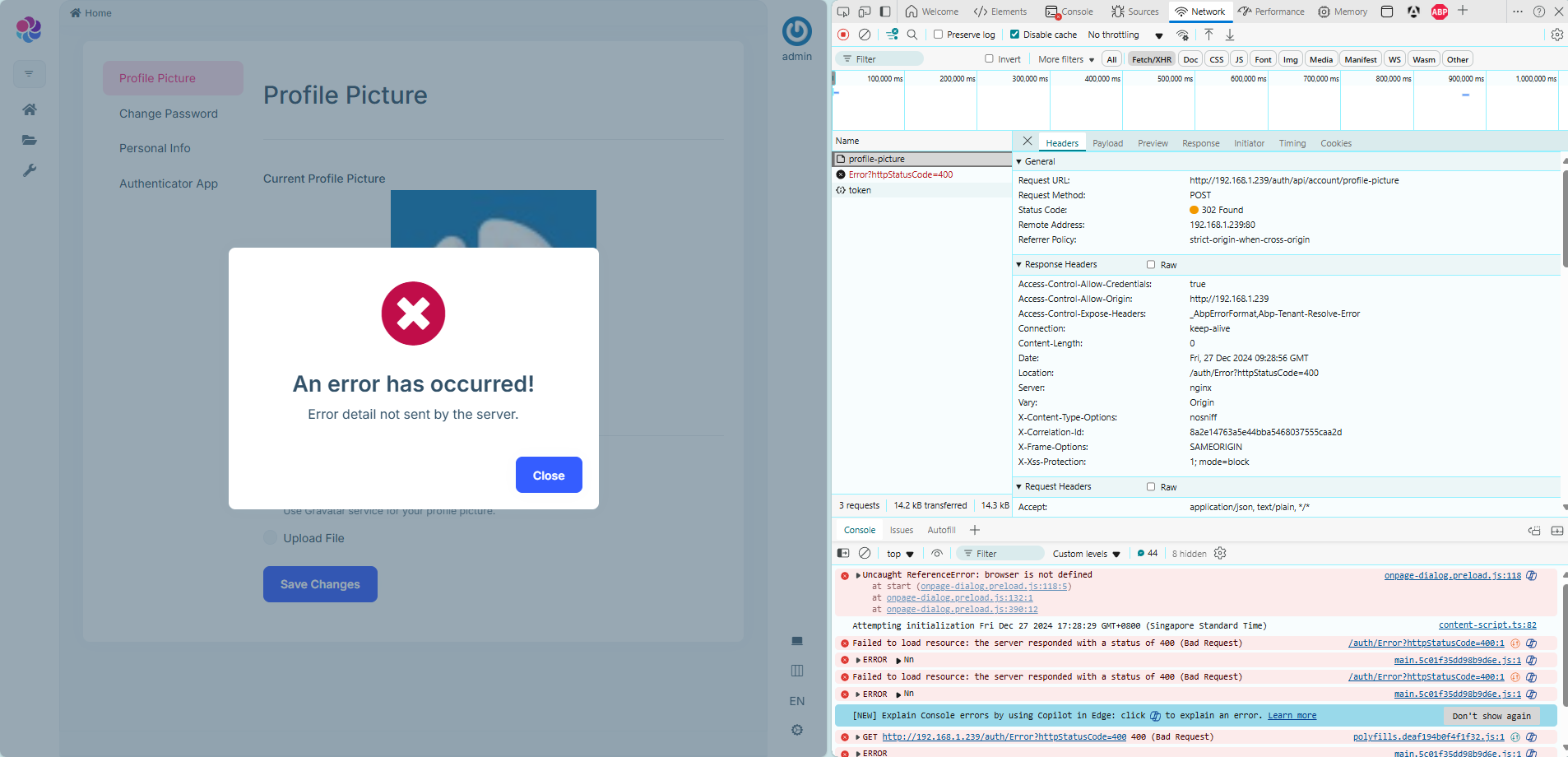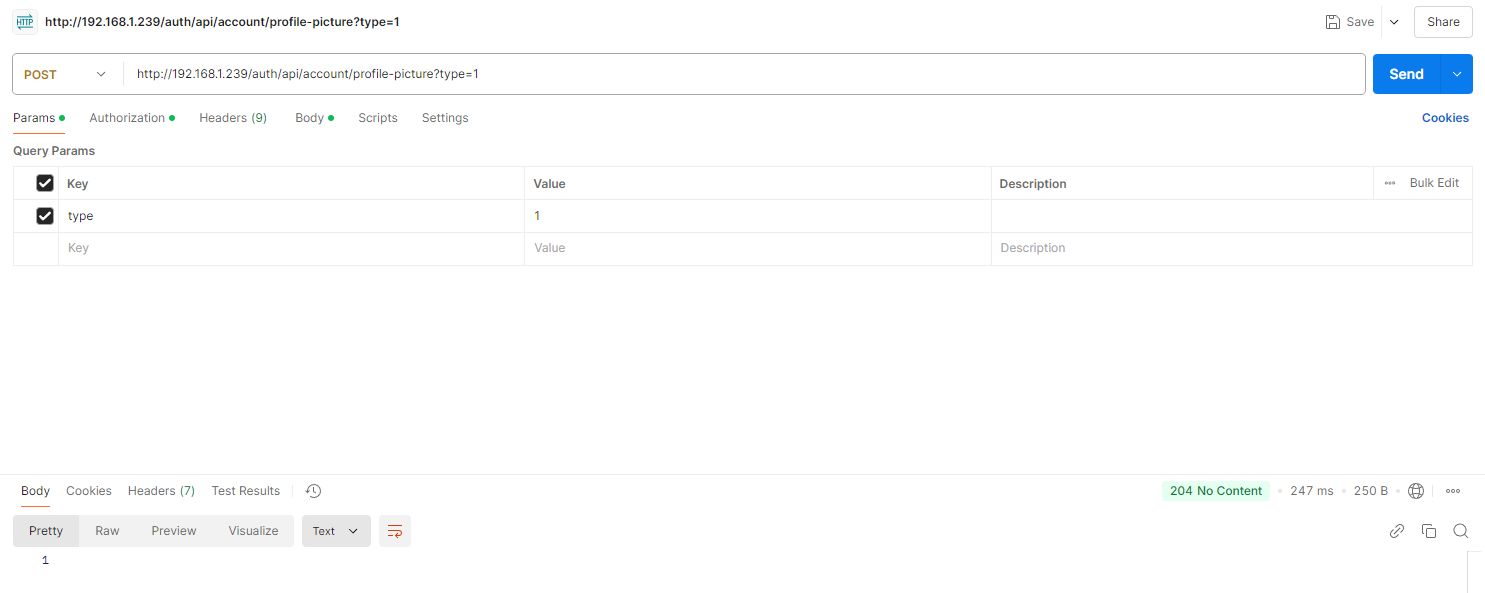hi
I have checked, your api website can’t communicate with authserver website.
Please check the network problem.
Thanks
It's worked. thanks.
hi
Can you enable the debug logs and
identitymodellogs then share them with liming.ma@volosoft.com?https://abp.io/support/questions/8622/How-to-enable-Debug-logs-for-troubleshoot-problems
Thanks.
ok sure
Provide us with the following info:
🧐 Hint: If you are using the ABP Studio, you can see all the information about your solution from the configuration window, which opens when you right-click on the solution and click on the Solution Configuration button.
1 notBefore, Nullable1 expires, IEnumerable`1 audiences, TokenValidationParameters validationParameters, BaseConfiguration configuration)
at Microsoft.IdentityModel.JsonWebTokens.JsonWebTokenHandler.ValidateSignature(JsonWebToken jwtToken, TokenValidationParameters validationParameters, BaseConfiguration configuration)
at Microsoft.IdentityModel.JsonWebTokens.JsonWebTokenHandler.ValidateSignatureAndIssuerSecurityKey(JsonWebToken jsonWebToken, TokenValidationParameters validationParameters, BaseConfiguration configuration)
at Microsoft.IdentityModel.JsonWebTokens.JsonWebTokenHandler.ValidateJWSAsync(JsonWebToken jsonWebToken, TokenValidationParameters validationParameters, BaseConfiguration configuration) upstream authserver_backend {
server master-authserver weight=8;
server slave-authserver weight=2;
}
...
location /auth/ {
proxy_pass http://authserver_backend;
proxy_http_version 1.1;
proxy_set_header Upgrade $http_upgrade;
proxy_set_header Connection $http_connection;
proxy_set_header Connection keep-alive;
proxy_set_header Host $host:$server_port;
proxy_set_header X-Forwarded-For $proxy_add_x_forwarded_for;
proxy_set_header X-Forwarded-Proto $scheme;
proxy_set_header X-Forwarded-Host $host;
proxy_set_header X-Forwarded-Port $server_port;
proxy_cache_bypass $http_upgrade;
proxy_read_timeout 7200;
port_in_redirect off;
proxy_buffering off;
}
The authserver configuration stays the same, and I checked the iss&aud of the token,It doesn't work well, unfortunately.
Thank you. It worked.
I think it's already set up because I'm using the angular template
POST /auth/api/account/profile-picture HTTP/1.1
Accept: application/json, text/plain, */*
Accept-Encoding: gzip, deflate
Accept-Language: en
Authorization: Bearer eyJhbGciOiJSUzI1NiIsImtpZCI6IjM4MDFDRTUxN0E2RDk0RDdGREI2MjA2NEM1MDY5Nzc4MUFCM0FBMDYiLCJ4NXQiOiJPQUhPVVhwdGxOZjl0aUJreFFhWGVCcXpxZ1kiLCJ0eXAiOiJhdCtqd3QifQ.eyJpc3MiOiJodHRwOi8vMTkyLjE2OC4xLjIzOS9hdXRoIiwiZXhwIjoxNzM1NTMyOTg0LCJpYXQiOjE3MzU1MjkzODQsImF1ZCI6IlVuaWZpZWQiLCJzY29wZSI6Im9mZmxpbmVfYWNjZXNzIG9wZW5pZCBwcm9maWxlIGVtYWlsIHBob25lIFVuaWZpZWQiLCJqdGkiOiIwNjMwZjhkZi02YzI1LTQ5MDktODE1NC03YWU5MGY0OWQ0ZjUiLCJzdWIiOiI4ODAyYzVhZS02ZmNjLTVmMjMtMjcxYS0zYTE3MTk2MzJiNDQiLCJzZXNzaW9uX2lkIjoiN2IwYTYzYWUtODk0YS00MGNlLTk2ZDQtYWI1MDI4NjNiY2M0IiwidW5pcXVlX25hbWUiOiJhZG1pbiIsIm9pX3Byc3QiOiJVbmlmaWVkX0FwcCIsIm9pX2F1X2lkIjoiYmVmMjg0YjktMWM4Ny1mNTRjLTQ0ZGQtM2ExNzE5OWVkZTUwIiwicHJlZmVycmVkX3VzZXJuYW1lIjoiYWRtaW4iLCJnaXZlbl9uYW1lIjoiYWRtaW4iLCJyb2xlIjoiYWRtaW4iLCJlbWFpbCI6ImFkbWluQGhrLmNvbSIsImVtYWlsX3ZlcmlmaWVkIjoiRmFsc2UiLCJwaG9uZV9udW1iZXJfdmVyaWZpZWQiOiJGYWxzZSIsImNsaWVudF9pZCI6IlVuaWZpZWRfQXBwIiwib2lfdGtuX2lkIjoiMWE3OGRhODYtYzdjNC0xMDM2LWMwYTAtM2ExNzI3YzlhMmQ0In0.ACvv3DieHjORlLo_6qXLwMant-Dj5-TujgBjo0b7ES1rCC0AwHrUg9imbXhK3JUYXD7oWRnQ3cb7oMaLl3Y9QFY16qt1VRyxQs4kADIi65SQ1zPW-ENTV_oyuPLXoz4TF8MSai3TUVn-7GwzUCJAn7zY_Xa3GL5jMSMIX_RSmx7VdEcJVHTlwDgdFxYl3RU3LCJmDkf_sQPk7ProGfh5E61MXP0E9n9OK17STE5c8dSR8GV__CaUcTrBcebwzk0zRem-G7Ad-qc3aUyKg00rUz86APTO3qF3MBEsWOQ9EQoeXo14SnxMMsEJQXnbvY12cNDU1ip1xZRQL8Y9G2p8LQ
Cache-Control: no-cache
Connection: keep-alive
Content-Length: 136
Content-Type: multipart/form-data; boundary=----WebKitFormBoundarySPuhuxdBktccjLff
Cookie: .AspNetCore.Antiforgery.rWqVC0Yg1m8=CfDJ8F6VyteeqP1DvSGYmwyKzXHCsxX-sRnmSILKN4j4tpxsSPwjORZ7HlTIvwaN-K86vcM_sD-_1kz_oIKhTnaOX_3mPB7rhdyTOKUpYU0XZlMG05f8G-uf5IJFRu-ShivrlmenHFudwm5IjA15QwoSEfs; .AspNetCore.Identity.Application=CfDJ8F6VyteeqP1DvSGYmwyKzXGzn7NEGL40tohVe29OADmYSDI8uNZ3x7EgKSQPLBIjotk2UJiPVfno5MID0SlVFZgh_h-85_SGiZzru6aewiRglgyR2OtDXkxFNazJBv1ALTE027h5znZ4IM8kFht4eglfG75Jsr2v9M_05HCeFm2NzE0WKEAyAAO1QZYVTFpPAMxvl-FcUHKO4SyOTX_ts7yha9_lBcdvv6NhpAlALwfmDfMtno2vNbgchRjBDJ8qs5itPoUhUjnKZehf60oKSZxMa_DEkT3Smy60J1LNgNEL6OLTwgfnuSC3r7rVvbSI6QUUntzBZcdimzWyTlA_ZND1g24kfgDolPhqbxK11OINAvWStVaELUffRkTEJBHZ5YXokieIjQeyswIadk1zBc58SN-3nqEmeVerutlXtUFvxqgHK3dqxdisTphTfxTIjCpthgdCrdEMdWgtykq1oKksKEPEthXhtw3ok5hk-F3yS8dHhJVGrADY_jBCI6ILyqsCGIO98Joj-hBAMoxlBmoM2UhnBgOLjN94rcXizS71stpzy2E_xfEZmpu7-ib_Yrn4hUi4dlgPfu8QlToiM0KHIOLhennoCQmTnrOl2yMC8wiQ6R27KWTd7tFs-mxx-U7HdTlCJ-3FXIBANmXeNyNEGFeYM76dUYII9VCs5Hep_rNZJpF7GTzmX1g4_oq1VXrGha6VXcGgaRVCFB1DRxDO-5Bhy6j21LddN3LjumWrYA7qe-7ydoptGMYIH8lVIkiZa-UX1mbEN1JDt8NRVTM440DUqPBC9yRFCG2t4ZLKieyRNxU5PvMt1xoIV8B_E5fEr8ATGPrrNVwQ0kHfAG4; _pk_id.1.199d=16e65ccb13ca5ba8.1735287782.; lpx_loaded-css=light; .AspNet.Consent=true; _pk_ses.1.199d=1; portainer_api_key=eyJhbGciOiJIUzI1NiIsInR5cCI6IkpXVCJ9.eyJpZCI6MSwidXNlcm5hbWUiOiJhZG1pbiIsInJvbGUiOjEsInNjb3BlIjoiZGVmYXVsdCIsImZvcmNlQ2hhbmdlUGFzc3dvcmQiOmZhbHNlLCJleHAiOjE3MzU1NTgxNDUsImp0aSI6IjIyZTUxYzNkLTczMjgtNDEzOC05YzBmLTA0MWUzN2E1YTI5MSIsImlhdCI6MTczNTUyOTM0NX0.2UTKRplGvsnK8g2ZqVlitJcLykuOFXb8yxSWZREPtzM; _gorilla_csrf=MTczNTUyOTM0NXxJa2xVU1VwU1dFdFZPVGhKWjNOck0zbzRTMU50VTJKb1VXNXhiRVYzZUZSaVIxa3lhbVJsYVZSWk1tTTlJZ289fOZxehdIvJeSENG3By-2HBVYI_raN_QvTMjLFjiyzPkA; .AspNetCore.Culture=c%3Den%7Cuic%3Den
Host: 192.168.1.239
Origin: http://192.168.1.239
Pragma: no-cache
Referer: http://192.168.1.239/account/manage
User-Agent: Mozilla/5.0 (Windows NT 10.0; Win64; x64) AppleWebKit/537.36 (KHTML, like Gecko) Chrome/132.0.0.0 Safari/537.36 Edg/132.0.0.0
X-Requested-With: XMLHttpRequest
hi
Please share the debug logs(
.MinimumLevel.Debug()) for the requests.Thanks.
public class Program { public async static Task<int> Main(string[] args) { Log.Logger = new LoggerConfiguration() .MinimumLevel.Debug() .MinimumLevel.Override("Microsoft.EntityFrameworkCore", LogEventLevel.Warning) .Enrich.FromLogContext() .WriteTo.Async(c => c.File("Logs/logs.txt")) .WriteTo.Async(c => c.Console()) .CreateLogger();
Good morning, here are the logs for the period of this request, is this the part that is causing this?
[11:29:59 WRN] The required antiforgery request token was not provided in either form field "__RequestVerificationToken" or header value "RequestVerificationToken".
full log:
[11:29:50 INF] Request finished HTTP/1.1 GET http://192.168.1.239:80/auth/.well-known/jwks - 200 1652 application/json;charset=UTF-8 2.8174ms
[11:29:50 INF] Request starting HTTP/1.1 GET http://192.168.1.239:80/auth/api/account/profile-picture/8802c5ae-6fcc-5f23-271a-3a1719632b44 - null null
[11:29:50 INF] Executing endpoint 'Volo.Abp.Account.AccountController.GetProfilePictureAsync (Volo.Abp.Account.Pro.Public.HttpApi)'
[11:29:50 INF] Route matched with {area = "account", action = "GetProfilePicture", controller = "Account", page = ""}. Executing controller action with signature System.Threading.Tasks.Task`1[Volo.Abp.Account.ProfilePictureSourceDto] GetProfilePictureAsync(System.Guid) on controller Volo.Abp.Account.AccountController (Volo.Abp.Account.Pro.Public.HttpApi).
[11:29:50 INF] Start processing HTTP request GET https://secure.gravatar.com/avatar/56fb3546cf8d231c99b0950abacfad5e
[11:29:50 INF] Sending HTTP request GET https://secure.gravatar.com/avatar/56fb3546cf8d231c99b0950abacfad5e
[11:29:50 INF] Received HTTP response headers after 4.7029ms - 200
[11:29:50 INF] End processing HTTP request after 4.8299ms - 200
[11:29:50 INF] Executing ObjectResult, writing value of type 'Volo.Abp.Account.ProfilePictureSourceDto'.
[11:29:50 INF] Executed action Volo.Abp.Account.AccountController.GetProfilePictureAsync (Volo.Abp.Account.Pro.Public.HttpApi) in 18.7215ms
[11:29:50 INF] Executed endpoint 'Volo.Abp.Account.AccountController.GetProfilePictureAsync (Volo.Abp.Account.Pro.Public.HttpApi)'
[11:29:50 INF] Request finished HTTP/1.1 GET http://192.168.1.239:80/auth/api/account/profile-picture/8802c5ae-6fcc-5f23-271a-3a1719632b44 - 200 null application/json; charset=utf-8 41.1873ms
[11:29:50 INF] Request starting HTTP/1.1 GET http://192.168.1.239:80/auth/api/account/my-profile - null null
[11:29:50 INF] Executing endpoint 'Volo.Abp.Account.ProfileController.GetAsync (Volo.Abp.Account.Pro.Public.HttpApi)'
[11:29:50 INF] Route matched with {area = "account", controller = "Profile", action = "Get", page = ""}. Executing controller action with signature System.Threading.Tasks.Task`1[Volo.Abp.Account.ProfileDto] GetAsync() on controller Volo.Abp.Account.ProfileController (Volo.Abp.Account.Pro.Public.HttpApi).
[11:29:50 INF] Executing ObjectResult, writing value of type 'Volo.Abp.Account.ProfileDto'.
[11:29:50 INF] Executed action Volo.Abp.Account.ProfileController.GetAsync (Volo.Abp.Account.Pro.Public.HttpApi) in 8.9724ms
[11:29:50 INF] Executed endpoint 'Volo.Abp.Account.ProfileController.GetAsync (Volo.Abp.Account.Pro.Public.HttpApi)'
[11:29:50 INF] Request finished HTTP/1.1 GET http://192.168.1.239:80/auth/api/account/my-profile - 200 null application/json; charset=utf-8 41.0819ms
[11:29:50 INF] Request starting HTTP/1.1 GET http://192.168.1.239:80/auth/api/account/my-profile/can-enable-two-factor - null null
[11:29:50 INF] Executing endpoint 'Volo.Abp.Account.ProfileController.CanEnableTwoFactorAsync (Volo.Abp.Account.Pro.Public.HttpApi)'
[11:29:50 INF] Route matched with {area = "account", controller = "Profile", action = "CanEnableTwoFactor", page = ""}. Executing controller action with signature System.Threading.Tasks.Task`1[System.Boolean] CanEnableTwoFactorAsync() on controller Volo.Abp.Account.ProfileController (Volo.Abp.Account.Pro.Public.HttpApi).
[11:29:50 INF] Executing ObjectResult, writing value of type 'System.Boolean'.
[11:29:50 INF] Executed action Volo.Abp.Account.ProfileController.CanEnableTwoFactorAsync (Volo.Abp.Account.Pro.Public.HttpApi) in 11.7547ms
[11:29:50 INF] Executed endpoint 'Volo.Abp.Account.ProfileController.CanEnableTwoFactorAsync (Volo.Abp.Account.Pro.Public.HttpApi)'
[11:29:50 INF] Request finished HTTP/1.1 GET http://192.168.1.239:80/auth/api/account/my-profile/can-enable-two-factor - 200 null application/json; charset=utf-8 35.0054ms
[11:29:50 INF] Request starting HTTP/1.1 GET http://192.168.1.239:80/auth/api/account/profile-picture/8802c5ae-6fcc-5f23-271a-3a1719632b44 - null null
[11:29:50 INF] Executing endpoint 'Volo.Abp.Account.AccountController.GetProfilePictureAsync (Volo.Abp.Account.Pro.Public.HttpApi)'
[11:29:50 INF] Route matched with {area = "account", action = "GetProfilePicture", controller = "Account", page = ""}. Executing controller action with signature System.Threading.Tasks.Task`1[Volo.Abp.Account.ProfilePictureSourceDto] GetProfilePictureAsync(System.Guid) on controller Volo.Abp.Account.AccountController (Volo.Abp.Account.Pro.Public.HttpApi).
[11:29:50 INF] Start processing HTTP request GET https://secure.gravatar.com/avatar/56fb3546cf8d231c99b0950abacfad5e
[11:29:50 INF] Sending HTTP request GET https://secure.gravatar.com/avatar/56fb3546cf8d231c99b0950abacfad5e
[11:29:50 INF] Received HTTP response headers after 4.4121ms - 200
[11:29:50 INF] End processing HTTP request after 4.5253ms - 200
[11:29:50 INF] Executing ObjectResult, writing value of type 'Volo.Abp.Account.ProfilePictureSourceDto'.
[11:29:50 INF] Executed action Volo.Abp.Account.AccountController.GetProfilePictureAsync (Volo.Abp.Account.Pro.Public.HttpApi) in 21.338ms
[11:29:50 INF] Executed endpoint 'Volo.Abp.Account.AccountController.GetProfilePictureAsync (Volo.Abp.Account.Pro.Public.HttpApi)'
[11:29:50 INF] Request finished HTTP/1.1 GET http://192.168.1.239:80/auth/api/account/profile-picture/8802c5ae-6fcc-5f23-271a-3a1719632b44 - 200 null application/json; charset=utf-8 41.3687ms
[11:29:59 INF] Request starting HTTP/1.1 POST http://192.168.1.239:80/auth/api/account/profile-picture - multipart/form-data; boundary=----WebKitFormBoundarySPuhuxdBktccjLff 136
[11:29:59 INF] CORS policy execution successful.
[11:29:59 INF] Executing endpoint 'Volo.Abp.Account.AccountController.SetProfilePictureAsync (Volo.Abp.Account.Pro.Public.HttpApi)'
[11:29:59 INF] Route matched with {area = "account", action = "SetProfilePicture", controller = "Account", page = ""}. Executing controller action with signature System.Threading.Tasks.Task SetProfilePictureAsync(Volo.Abp.Account.ProfilePictureInput) on controller Volo.Abp.Account.AccountController (Volo.Abp.Account.Pro.Public.HttpApi).
[11:29:59 WRN] The required antiforgery request token was not provided in either form field "__RequestVerificationToken" or header value "RequestVerificationToken".
[11:29:59 INF] Authorization failed for the request at filter 'Volo.Abp.AspNetCore.Mvc.AntiForgery.AbpAutoValidateAntiforgeryTokenAuthorizationFilter'.
[11:29:59 INF] Executing StatusCodeResult, setting HTTP status code 400
[11:29:59 INF] Executed action Volo.Abp.Account.AccountController.SetProfilePictureAsync (Volo.Abp.Account.Pro.Public.HttpApi) in 0.4786ms
[11:29:59 INF] Executed endpoint 'Volo.Abp.Account.AccountController.SetProfilePictureAsync (Volo.Abp.Account.Pro.Public.HttpApi)'
[11:29:59 INF] Request finished HTTP/1.1 POST http://192.168.1.239:80/auth/api/account/profile-picture - 302 0 null 22.3374ms
[11:29:59 INF] Request starting HTTP/1.1 GET http://192.168.1.239:80/auth/Error?httpStatusCode=400 - null null
[11:29:59 INF] Executing endpoint 'Volo.Abp.AspNetCore.Mvc.UI.Theme.Shared.Controllers.ErrorController.Index (Volo.Abp.AspNetCore.Mvc.UI.Theme.Shared)'
[11:29:59 INF] Route matched with {action = "Index", controller = "Error", area = "", page = ""}. Executing controller action with signature System.Threading.Tasks.Task`1[Microsoft.AspNetCore.Mvc.IActionResult] Index(Int32) on controller Volo.Abp.AspNetCore.Mvc.UI.Theme.Shared.Controllers.ErrorController (Volo.Abp.AspNetCore.Mvc.UI.Theme.Shared).
[11:29:59 INF] Executing ViewResult, running view ~/Views/Error/Default.cshtml.
[11:29:59 WRN] The cookie 'XSRF-TOKEN' has set 'SameSite=None' and must also set 'Secure'.
[11:29:59 INF] Executed ViewResult - view ~/Views/Error/Default.cshtml executed in 9.2988ms.
[11:29:59 INF] Executed action Volo.Abp.AspNetCore.Mvc.UI.Theme.Shared.Controllers.ErrorController.Index (Volo.Abp.AspNetCore.Mvc.UI.Theme.Shared) in 12.636ms
[11:29:59 INF] Executed endpoint 'Volo.Abp.AspNetCore.Mvc.UI.Theme.Shared.Controllers.ErrorController.Index (Volo.Abp.AspNetCore.Mvc.UI.Theme.Shared)'
[11:29:59 INF] Request finished HTTP/1.1 GET http://192.168.1.239:80/auth/Error?httpStatusCode=400 - 400 null text/html; charset=utf-8 29.6397ms
I want to deploy the application through one site , the other interfaces work fine except for it: Authorization service deployed under the path /auth/. Main application deployed under the root path /. From the application, I make a request to update the profile picture by calling:
POST /auth/api/account/profile-picture
However, the response is a 302 redirect pointing to:
/auth/Error?httpStatusCode=400
On the other hand, when I send the same request (same URL, same HTTP method, same payload) using Postman, it returns a 204 (No Content) response, which indicates success.
I can't find the problem at the moment. Help me.


Gateway is like a reverse proxy server.
thank u,it's worked, I'm just using the gateway as a proxy, I don't need to use swagger like microservices, previously I referenced the microservices template.
hi
I want to proxy the api through the gateway
Gateway is like a reverse proxy server.
Your auth server is
localhost:44333,but your swagger website can't reach the auth server.Is
localhost:44333available?
I think I've solved it, I've proxied both authserver and hostapi through gateway, and now I'm left with the last one, and I don't know why I'm getting multiple inputs.
if (IsSwaggerEnabled(configuration))
{
app.UseSwagger();
app.UseAbpSwaggerUI(options => { ConfigureSwaggerUI(proxyConfig, options, configuration); });
app.UseRewriter(CreateSwaggerRewriteOptions());
}
private static bool IsSwaggerEnabled(IConfiguration configuration)
{
return bool.Parse(configuration["Swagger:IsEnabled"] ?? "true");
}
private void ConfigureSwagger(ServiceConfigurationContext context, IConfiguration configuration)
{
if (IsSwaggerEnabled(configuration))
{
context.Services.AddAbpSwaggerGen();
}
}
private static void ConfigureSwaggerUI(
IProxyConfig proxyConfig,
SwaggerUIOptions options,
IConfiguration configuration)
{
foreach (var cluster in proxyConfig.Clusters)
{
options.SwaggerEndpoint($"/swagger-json/{cluster.ClusterId}/swagger/v1/swagger.json", $"{cluster.ClusterId} API");
}
options.OAuthClientId(configuration["AuthServer:SwaggerClientId"]);
options.OAuthScopes(
"Unified"
);
}

